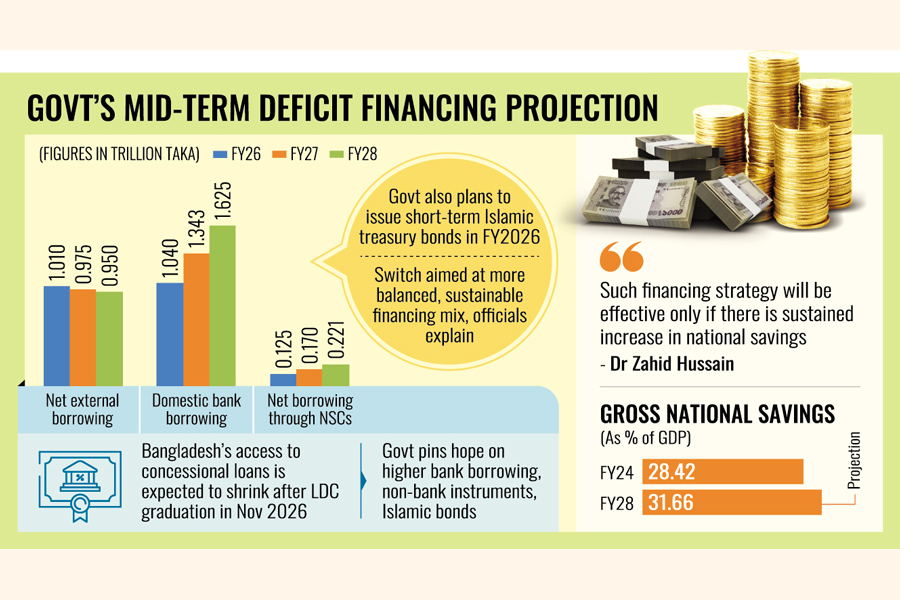BRIDGING BUDGET DEFICIT WITH BORROWED MONEY
Bangladesh pivots to domestic finance to cut costly foreign funds

Published :
Updated :

Bangladesh plans gradually reducing reliance on external borrowing to finance budget deficits as rising cost of foreign loans makes the government inward-bound for pooling higher domestic funds.
The pivot towards ramped-up domestic borrowing -- particularly from the banking system -- is distinct in new budgetary plans. The budget documents for financial year 2025-26 draws an outlook of higher internal-resource mobilisation through FY2028.
As outlined in the strategic pivot in deficit financing, the exchequer will be drawing in higher volumes from bank borrowing, nonbank instruments, and the introduction of short-term Islamic bond called Sukuk.
Officials say the switch is aimed at ensuring a more balanced and sustainable financing mix while managing risks associated with interest- rate volatility and foreign-exchange exposure.
Net external borrowings are expected to decline to Tk 1.01 trillion in FY2026 from Tk 1.09 trillion in 2025, further tapering out to Tk 975 billion in FY2027 and Tk 950 billion in FY2028.
In contrast, bank borrowings are projected to rise sharply to Tk 1.04 trillion in FY2026, over Tk 1.34 trillion (Tk 1,343 billion) in FY2027, and Tk 1.63 trillion (Tk 1,625 billion) in FY2028.
Among nonbank sources, the government aims to revitalize borrowing through national savings certificates (NSCs), with projected net amounts of Tk 125 billion in FY2026, Tk 170 billion in FY2027 and Tk 221 billion in FY2028.
This marks a reversal from the recent trends. In FY2024, NSCs recorded negative net borrowing of Tk 180 billion, and in FY2025, only Tk 154 billion in net funds is expected from the popular retail instrument.
Budget documents note that NSC yields were revised upward in December 2024 to align more closely with prevailing market interest rates, which is expected to revive public interest in these secure financial products.
In a significant development, the government also plans to issue short-term Islamic treasury bonds from FY2026, expanding its use of Shariah-compliant financing tools to tap into new segments of institutional and retail investors.
Bangladesh traditionally prefers concessional loans-those with low interest rates, long grace periods, and extended repayment terms.
However, such preferential access is expected to shrink after Bangladesh's graduation from least-developed country (LDC) status in November 2026 along a UN-designated timeline that the current interim government has reaffirmed.
"As Bangladesh transitions out of LDC status, concessional external financing will become increasingly limited," says one official familiar with the government debt wing.
"This necessitates a shift toward more diverse, resilient, and cost-effective domestic sources."
Economists warn that while diversifying funding sources is prudent, the rising dependence on domestic borrowing -- especially from the banking system -- could crowd out private-sector credits and inflate domestic interest rates.
Rising yields on treasury bonds and bills in recent months reflect growing market concerns about fiscal sustainability, particularly as the government's total debt burden increases and inflation remains elevated.
Dr Zahid Hussain, a renowned economist in Bangladesh, thinks the government-conceived borrowing strategy will be effective only if there is a sustained increase in national savings.
Gross national savings, which slightly dropped to 28.42 percent of GDP in 2024, are expected to recover gradually in the years ahead.
"The government anticipates that national savings will rise to 31.66 per cent of GDP by FY2028, supported by expectations of stabilising inflation, stronger remittance inflows, and improved savings behaviour among households and corporations," the official budget documents read.
The finance authority also states a strategic intent to reduce dependence on external financing and to ensure greater macroeconomic stability through enhanced domestic resource mobilisation.
However, Dr Hussain emphasises that Bangladesh should not entirely shy away from external borrowing, particularly from multilateral institutions such as the World Bank, the IMF, and the ADB, where interest rates are generally lower than domestic borrowing costs.
"External financing plays a vital role -- not only because it's often cheaper but also because it brings in foreign exchange, helping to stabilise the foreign-exchange market," he says.
The economist warns that excessive reliance on domestic borrowing could strain national savings and risk a crowding-out effect, where government borrowing competes with private-sector credit.
"If imports are financed using only domestic resources, it could pressure national savings and reduce the availability of funds for private investment," says Dr Hussain, who had served the WB as its chief economist in Dhaka office.
jasimharoon@yahoo.com


 For all latest news, follow The Financial Express Google News channel.
For all latest news, follow The Financial Express Google News channel.